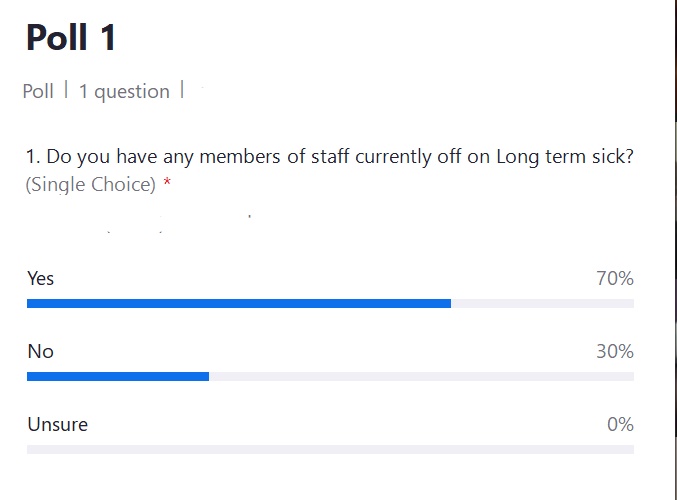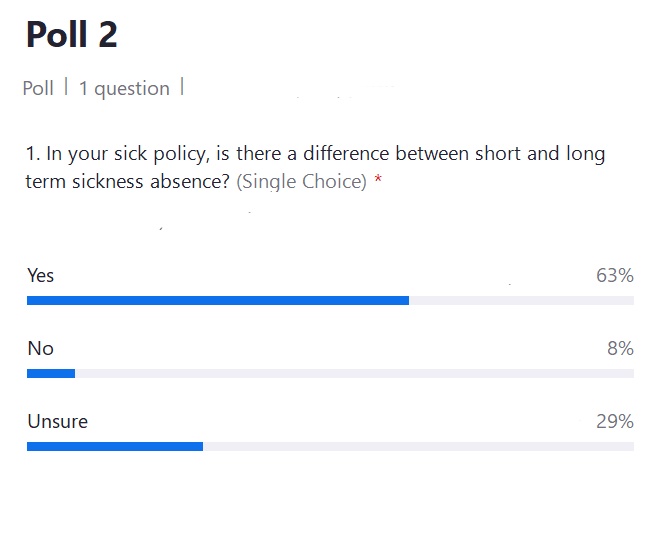Employment Law: Top Tips for Managing Sickness Absence

This summary is based on Judicium’s Employment Law ‘Sofa Session’ from the 15th of March, with our resident expert Suzanne Ravenhall, MCIPD. This session focused on ensuring you are following the correct policy; how and when to contact staff that are absent; how best to utilise return to work meetings; and should you consider the importance of trigger points when necessary?
Polls


In recent months the majority of our clients have seen an increase in both long and short-term sickness absences. The aim of any managing sickness absence process is to prevent it as much as you can by being supportive, but sometimes sickness absence is unavoidable.
5 Top Tips for Managing Sickness Absence
1. Consider your policy
You should have a sickness absence policy in place that treats short-term and long-term sickness absence differently.
The main difference between the two processes is that short-term sickness absence processes often lead to first/final warnings akin to a disciplinary warning. However, schools should not be seen to be disciplining staff for having a disability or underlying health condition. Therefore, the long-term aspect of the policy should warn staff that the school will move to the next stage in the process – an Improvement Notice, rather than a warning.
Furthermore, you can talk about improvements to attendance, rather than resolving the absence. It’s a subtle play on words but dismissing for absence if the employee has an underlying health condition can be discriminatory.
Usually, absences will very clearly fall within one of these categories, but you must ensure you are referencing and utilising the correct policy and procedure from the outset.
NB: It’s difficult to switch between policies. It delays matters if you’ve been managing someone’s short-term absence and then must switch them to the long-term absence portion of the policy.
2. Don't be scared to make contact
We often receive queries regarding the appropriateness of making contact with staff when they are off sick. It is absolutely appropriate, particularly with absences such as work-related stress, because the sooner you can get to the bottom of the problem, the sooner you can take action.
Record that contact has been made. Texting or WhatsApp messaging are great methods as there’ll be a thread, and often contacting an employee these ways appears less threatening.
We always recommend starting off by asking ‘if it’s okay to talk,’ or with you thought you’d ‘call to see how they are.’ If they say they’d rather not speak that’s fine, but explain you’ll try again in a couple of weeks if they remain off sick. Calling is important as employers can be seen as failing in their duty of care by not doing it.
Also, if the school does not speak to the employee to find out what the problem is, there is nothing you can do to tackle it. Ideally, you want to work with the employee to help arrange a return to work.
Employers can and should make reasonable contact with their employees when they are signed off as unfit for work. However, the school shouldn’t ‘hound’ an employee and if the employee requests some space, that request should be respected.
3. Utilise return-to-work meetings and welfare meetings
If a member of staff is absent for a short period and returns to work, try to make the most of your return-to-work (RTW) meeting process.
- Use the RTW to discuss the reasons for the absence and any way in which it can be avoided moving forward.
- Ask if they are well enough to be back at work?
- Do they need any adjustments to be in work and to stay in work?
- Cross check their absence has been recorded appropriately and they’ve provided sufficient sicknotes to cover the absence. NB: Don’t forget missing sicknotes means no salary!
- Keep a record of the meeting. You’ll use these later on if the issue comes up again, or if the employee claims you’ve been anything less than reasonable.
These meetings can be very helpful in highlighting and tracking any patterns of absence – particularly if the absences are odd days here and there and highlighting when any trigger points are approaching, e.g., the Friday-Monday syndrome.
Welfare meetings are similar and can be used when the employee is still off sick. They are like a return-to-work meeting in that the goal is to find out what you can do to support the employee back into the workplace. You also may have to recognise the employee is going to be off for longer.
Your employee has a duty to meet with you and to ensure they are getting fit to return to work. If their sicknote says “is not fit enough for work meetings,” ask Occupational Health for advice.
Never doubt the medical evidence provided by the employee. Leave those decisions to the qualified experts.
4. If trigger points are hit, act consistently
If a member of staff does hit a trigger point, don’t delay in acting, and consider whether an informal or even a formal meeting needs to be arranged.
If you have a member of staff that has consistently poor attendance, it is unlikely to change without any direct challenge from the school. However, you should use the policy to guide you, not as a tick list. NB: Always consider the reasons for the absence and the person behind the process.
For short-term absences where a few odd days of sickness are mounting up, look at the staff member’s overall ‘rolling year’ and consider whether the picture is one of increasing absence or decreasing absence.
Long-term absences (usually listed as an absence over 4 weeks or more), look at the entire picture.
- Is this a good employee who rarely takes time off?
- Have they been a loyal servant to the school?
- What’s their length of service?
- What condition do they have?
- What’s the prognosis?
Despite the nature of the absence, it’s not reasonable for employers to be expected to keep roles open indefinitely. Work with Occupational Health to find out how you can bring this person back to work and what reasonable adjustments can be made. When considering adjustments, set out if they are permanent or temporary. Some adjustments wax and wane depending on the needs of the employee.
There are certain conditions that will always be categorised as a disability in the eyes of the law – cancer (whether they’re in remission or not), Multiple sclerosis and HIV to name a few.
Ensure you know and understand whether the condition is likely to fall under the Equality Act, and you are not dismissing them because of a condition, but a failure to improve their attendance. This subtle difference is key!
5. Take prompt action
Often advice is sought on sickness absences that have been ongoing for months or years with no steps having been taken to support the employee or manage his/her absence.
Ideally, contact your HR provider as soon as an issue arises so they can start an action plan for you to support and manage the employee, and ensure any actions are followed up at appropriate times.
It is key that both the employer and employee know what the next step will be and when this action will be taken. Be honest from the outset with the employee so they understand what’s happening NOW and what’s going to happen NEXT if things aren’t resolved, and ultimately what the end result will be.
Helpful Info:
Summary Notes from Supporting Staff Through the Menopause - https://www.judiciumeducation.co.uk/news/employment-law-supporting-staff-through-the-menopause
If you’d like to review Judicium’s forthcoming sofa sessions please click here
Follow us on Twitter: @JudiciumEDU
© This content is the exclusive property of Judicium Education. The works are intended to provide an overview of the sofa session you attend and/or to be a learning aid to assist you and your school. However, any redistribution or reproduction of part or all of the contents in any form is prohibited. You may not, except with our express written permission, distribute or exploit the content. Failure to follow this guidance may result in Judicium either preventing you with access to our sessions and/or follow up content.
Related content
(4).png)
The latest ERA implementation explains the imminent changes to trade union legislation, and several things that schools, trusts and colleges should do now to prepare.
.png)
On Tuesday 16th December 2025, the Employment Rights Bill was finally passed in Parliament and today, it has received Royal Assent! It is now the Employment Rights Act 2025.
(1).png)
On 27 November 2025, the UK government altered a flagship commitment in the Employment Rights Bill and dropped plans to grant most workers protection from unfair dismissal from their first day of employment. Instead, the Bill will now grant unfair-dismissal rights after six months of continuous service. Read this blog to uncover the reasons why, what this means for schools and how we can help.
(2).png)
In this post, we look at the four ERB Consultations that have been launched by the government and set out links to the consultations so that you can have your say.
.png)
Whats New | Sofa Sessions | HR
In this blog, we'll share the summary notes from our HR and Employment Law Sofa Session from the 19th November, delivered by our resident expert, Kirstie Young.
.png)
In this blog, we will explore the significance of enhancing performance and best practice in education and how it can be implemented effectively.

Whats New | HR